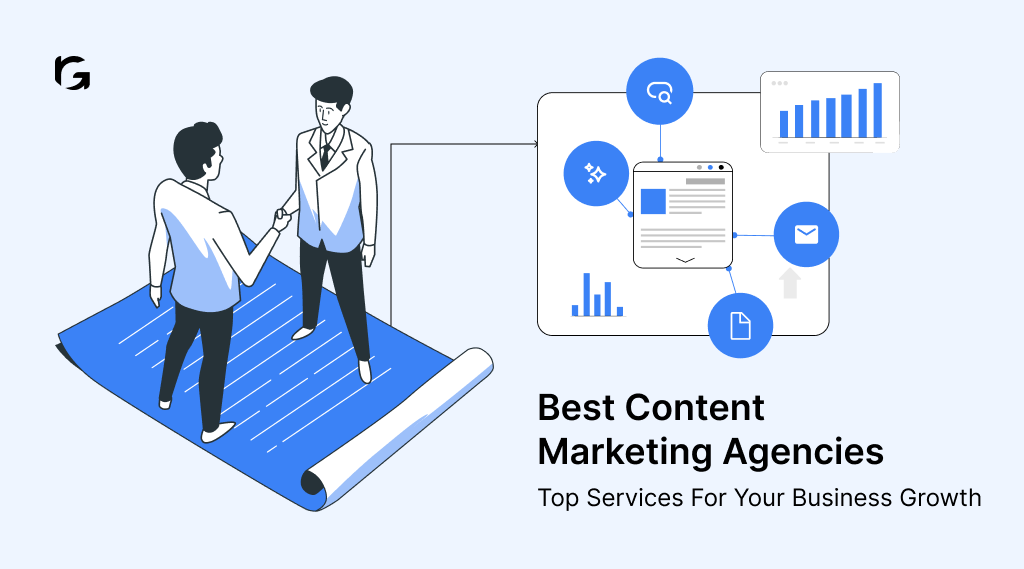Introduction
As we inch closer to 2024, the role of creative content marketing in boosting brand success has never been more critical. Crafting a winning content strategy requires a nuanced understanding of the diverse avenues available, along with a keen eye for emerging trends and the right set of tools to leverage them.Join me on this journey as we explore the 11 types of content marketing that are poised to shape the digital realm in 2024. From interactive experiences to data-driven narratives, each facet of this comprehensive guide is designed to empower your brand and propel it to the forefront of your industry. Let's delve into the strategies, tips, and tools that will not only elevate your content but also solidify your brand's standing at the pinnacle of Google's search results. Buckle up; the future of content marketing awaits.
What is Content Marketing?
Before we dive into the intricacies of the 11 types of content marketing, let's establish a solid foundation by understanding the essence of content marketing itself.At its core, content marketing is more than just creating and disseminating information; it's an artful blend of strategy, storytelling, and engagement. In a digital era where attention spans are fleeting and consumer choices abound, content marketing serves as the linchpin that connects brands with their target audience on a deeper level.Content marketing goes beyond the conventional advertising approach. It's about providing value, fostering relationships, and establishing authority within your niche. Whether it's a blog post, an interactive video, or a social media campaign, each piece of content should not merely promote a product or service but should also enrich the lives of the audience it seeks to reach.In the ever-expanding digital landscape, where competition for visibility is fierce, content marketing is the beacon that guides your brand through the noise. It's about creating a narrative that resonates, captivates, and, ultimately, converts. As we explore the 11 types of content marketing poised to dominate 2024, keep in mind that each strategy is a brushstroke contributing to the masterpiece that is your brand's success.
Why Content Marketing is Important?
Content isn't just king; it's the driving force that propels brands forward. Here's why content marketing is not just important but pivotal to the success of any modern business:
1. Builds Trust and Credibility:
Content marketing allows brands to establish themselves as authorities in their industry. By consistently delivering valuable and relevant information, brands cultivate trust and credibility among their audience.
2. Drives Organic Traffic:
Quality content is the backbone of search engine optimization (SEO). Search engines reward fresh, relevant, and authoritative content with higher rankings. As your content climbs the search results, it becomes a powerful magnet for organic traffic.
3. Nurtures Relationships:
Effective content isn't just about broadcasting messages; it's about fostering connections. Through blog posts, social media interactions, and other forms of content, brands can engage with their audience, respond to queries, and build lasting relationships.
4. Boosts Brand Awareness:
Consistent, high-quality content ensures that your brand remains visible. Whether it's through blog posts, social media shares, or multimedia content, each piece contributes to building and reinforcing brand awareness.
5. Facilitates Lead Generation:
Content acts as a subtle yet powerful lead generation tool. By offering valuable resources such as ebooks, webinars, or whitepapers, brands can capture leads and nurture them through the sales funnel.
6. Adaptable to Various Formats:
From written articles and infographics to podcasts and videos, content marketing is versatile. Brands can tailor their content to suit their audience's preferences and the platforms they frequent, ensuring a wider reach.
7. Encourages Customer Loyalty:
Beyond acquiring new customers, content helps retain existing ones. Regular updates, exclusive content for subscribers, and personalized communication contribute to building a community around your brand.
8. Demonstrates Expertise:
Content allows brands to showcase their industry knowledge and expertise. This demonstration not only attracts customers but also makes your brand the go-to source for information in your field.
9. Adapts to Changing Trends:
The digital landscape evolves rapidly, and so do consumer preferences. Content marketing provides the flexibility to adapt to emerging trends, keeping your brand relevant and responsive to market shifts.
10. Measurable Results:
With analytics tools, brands can track the performance of their content marketing efforts. Metrics such as engagement rates, conversion rates, and traffic sources offer valuable insights to refine and optimize strategies.Content marketing isn't just a promotional tactic; it's the heartbeat of a brand's digital presence. It's the conduit through which brands connect, communicate, and thrive in the ever-changing landscape of the digital marketplace. As we explore the 11 types of content marketing poised for success in 2024, keep in mind the transformative power each strategy holds in shaping the destiny of your brand.
Why You Need To Use Different Types Of Content In Your Strategies?
Incorporating a diverse range of content types into your strategy is crucial for several reasons:
1. Audience Diversity:
Different audience segments prefer consuming content in various formats. By offering a mix of content types, you can effectively reach and engage a broader audience. Some may prefer reading blog posts, while others may prefer watching videos or listening to podcasts.
2. Platform Relevance:
Various platforms cater to specific types of content. For instance, Instagram is ideal for visual content, YouTube for videos, and LinkedIn for professional articles. Tailoring your content to fit the strengths of each platform ensures optimal visibility and engagement.
3. Content Consumption Habits:
People have diverse preferences when it comes to how they consume content. While some may enjoy long-form articles, others may prefer quick, visually appealing infographics or interactive content. Catering to different consumption habits enhances the overall user experience.
4. Search Engine Optimization (SEO):
Search engines value diverse and high-quality content. Using a mix of content types not only keeps your audience engaged but also signals to search engines that your website provides a rich and varied user experience, potentially improving your search rankings.
5. Storytelling and Messaging:
Different content types allow for varied storytelling approaches. A complex concept might be best explained through an infographic or video, while a detailed case study or whitepaper can provide in-depth information. Tailoring your message to the content type enhances its impact.
6. Engagement and Interaction:
Interactive content, such as quizzes, polls, or surveys, encourages active participation from your audience. This type of engagement not only strengthens the connection with your audience but also provides valuable data and insights.
7. Lifecycle Marketing:
A well-rounded content strategy addresses the entire customer journey. From awareness-building blog posts to educational videos and customer testimonials, different content types support prospects at various stages of the buying process.
8. Social Media Amplification:
Social media platforms favor diverse content. By sharing a mix of articles, images, videos, and other formats, you increase the likelihood of your content being shared, commented on, and gaining traction across different social networks.
9. Adapting to Trends:
The digital landscape is dynamic, with new trends and formats emerging regularly. Being adaptable and incorporating emerging content types helps your brand stay current and resonate with the latest consumer preferences.
10. Comprehensive Branding:
A mix of content types contributes to a comprehensive and cohesive brand image. Whether it's the professionalism conveyed through articles, the relatability portrayed in social media posts, or the creativity showcased in videos, each content type plays a role in shaping your brand identity.A diverse content strategy allows you to cater to the preferences and habits of your audience, enhances your online visibility, and positions your brand as a dynamic and adaptable player in the digital landscape. As we explore the 11 types of content marketing poised for success in 2024, consider how each type can contribute to the richness and effectiveness of your overall content strategy.
What Are The 11 Essential Types Of Content?
Here are the 11 essential types of content marketing that are poised to boost your brand's success in the coming year, complete with tips and tools to maximize their effectiveness:1. Interactive Experiences:
- Tip: Create quizzes, polls, and interactive infographics to engage your audience actively.
- Tools: Use platforms like Typeform, Poll Everywhere, or Ceros for interactive content creation.
2. Video Content:
- Tip: Incorporate storytelling into your videos to captivate your audience emotionally.
- Tools: Leverage video creation tools such as Adobe Premiere Pro, InVideo, or even smartphone apps like TikTok.
3. Long-Form Articles and Guides:
- Tip: Dive deep into topics relevant to your audience, providing comprehensive insights.
- Tools: Use platforms like Google Docs, Microsoft Word, or Grammarly for content creation and editing.
4. Visual Content (Infographics, Memes, and GIFs):
- Tip: Convey complex information through visually appealing infographics, memes, or GIFs.
- Tools: Design graphics using tools like Canva, Venngage, or Giphy for creating GIFs.
5. Podcasts and Audio Content:
- Tip: Bring in industry experts or share compelling stories through your podcast.
- Tools: Use podcast hosting platforms like Anchor, Podbean, or Buzzsprout for distribution.
6. User-Generated Content:
- Tip: Encourage your audience to create and share content related to your brand.
- Tools: Platforms like Yotpo, TINT, or Taggbox can help curate and display user-generated content.
7. Live Streaming Events:
- Tip: Host live Q&A sessions, product launches, or behind-the-scenes events.
- Tools: Platforms like Facebook Live, Instagram Live, or Twitch for real-time engagement.
8. Social Media Stories:
- Tip: Use ephemeral content on platforms like Instagram and Snapchat to create a sense of urgency.
- Tools: Utilize the story features within social media platforms for quick, engaging updates.
9. Ebooks and Whitepapers:
- Tip: Offer in-depth insights and valuable resources through downloadable ebooks or whitepapers.
- Tools: Design and publish ebooks using tools like Designer, Beacon, or Canva.
10. Email Newsletters:
- Tip: Personalize newsletters and segment your audience for targeted content delivery.
- Tools: Utilize email marketing platforms like Mailchimp, Constant Contact, or Sendinblue.
11. Augmented Reality (AR) and Virtual Reality (VR) Content:
- Tip: Implement AR filters or VR experiences to provide immersive interactions.
- Tools: Explore AR tools like Spark AR Studio or VR platforms like Oculus for innovative content.
Remember, the key to a successful content strategy is not just using these types individually but creating a cohesive and integrated approach that aligns with your brand voice and resonates with your target audience. As we delve deeper into each content type, we'll uncover strategies, tips, and tools specific to maximizing their impact in 2024.
Conclusion
As we conclude our exploration into the dynamic realm of content marketing, it's evident that the landscape is continually evolving, presenting both challenges and exciting opportunities. In the ever-expanding digital marketplace of 2024, a robust content marketing strategy is not just a competitive advantage; it's a necessity for brands aiming to thrive and dominate their respective industries.Effective content marketing is a fusion of creativity, strategic thinking, and adaptability. It's about understanding your audience deeply, creating valuable and engaging content, and leveraging the right tools to streamline processes and gain insights. From SEO optimization and social media management to video creation and analytics, the tools at your disposal are key enablers of a successful content marketing ecosystem.The digital future is filled with exciting possibilities, and by embracing the multifaceted nature of content marketing, your brand can not only survive but thrive in the ever-evolving landscape. As you implement the strategies, tips, and tools discussed, keep the pulse of your audience at the forefront, and let the narrative you craft be the guiding force that propels your brand to new heights of success in 2024 and beyond.Ready to revolutionize your content strategy? Dive into the future with our guide and equip your brand for success. Explore the 11 types of content marketing now! Seize the opportunity, captivate your audience, and ascend to the #1 spot on Google. Let's embark on this journey together. Start now!"



.svg)


.png)

.webp)